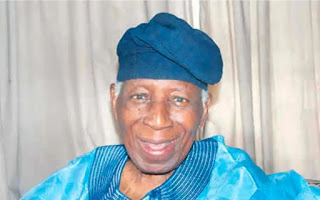By Amadi Chimaobi Kingsley
Finding Me, released in the month of women’s celebration, aims to be a feminist exploration of self-love and girl power told through the lens of a wife who wears butt pads and erotic costumes to impress her husband. Instead, it chooses to deflate these heavy themes with a romantic subplot that contradicts the film’s premise.
Ironically, Funke Akindele’s latest is about self-discovery. Yet, its 120-minute runtime stretches on with a protagonist who barely finds herself until the 110th minute or so. And when she finally does, it’s too convoluted to be taken seriously
The film’s premise should have been promising as it was Co-directed by Funke Akindele and Isioma Osaje.
Finding Me follows the story of Atinuke Phillips played by Funke Akindele herself, the CEO of Olowo Steel and daughter of the billionaire businessman, Chief Olowo (Dele Odule) as she is trapped in a stifling marriage and grapples with losing herself to a loveless marriage and the quest to find herself again and take control of her life.
Kolawole Phillips (Joseph Benjamin) who is Atinuke Husband is a man who is manipulative, deceitful, and emotionally distant. This setup has all the ingredients for an incisive exploration of emotional manipulation, power imbalances, and societal pressures. Instead, the film becomes burdened by underdeveloped subplots, abrupt tonal shifts, and half-baked resolutions.
One minute we’re dealing with infidelity and family disputes, the next, we are plunged into random comedy routines, to unnecessary fights. Atinuke’s relationship with Anthony (Efa Iwara) is the clearest example of this mess. Their romance appears from nowhere, without any real emotional build-up. There’s a scene right in the middle—Anthony touches Atinuke’s face and says, “Do you trust me?”—and it lands with such jarring emptiness, it makes you pause and wonder, “How did we even know Atinuke does not need another man, one who is everything Kola is not, to find herself or to heal?” Yet, the film stumbles further by framing Atinuke’s journey through a lens that reeks of the male gaze, reducing her empowerment to a new romantic savior rather than an inner triumph. The socio-cultural commentary—meant to critique pressures on women who want to make their marriage work—gets lost in this contradiction, leaving audiences with a hollow shell of a feminist narrative.
Funke Akindele shines a bit as Atinuke, a woman battling self-doubt, a toxic relationship, and toxic masculinity that slowly chip away at her confidence. Her performance is raw and relatable, pulling you into her world of silent suffering and quiet strength. It’s impossible not to root for her, hoping she’ll finally break free from the emotional chains holding her back. But does she break free? … Maybe—maybe not significantly. That’s the suspense that hooks the film’s central theme.
But Funke Akindele, as Tinuke, is far from her best in Finding Me. Her performance is neither impressive nor memorable, but she sustains much of the narrative solely through her established goodwill with audiences.
Funke Akindele dials down her usual flair. She doesn’t give us her typical comic mannerisms, and that is refreshing. But unfortunately, the character she’s playing lacks enough internal consistency to allow her performance to breathe naturally. Atinuke’s decisions, oscillating between feeling trapped and briefly liberated, are not given the time to develop naturally, leaving her journey feeling superficial. She makes silly decisions; her character remains static; she doesn’t develop as her character journey morphs from trapped to liberated and back to trapped. Her character ends up appearing unwise from the beginning to the end as she doesn’t “find herself”, doesn’t grow genuinely as the situations around her only force her to accept what comes to her
Joseph Benjamin, as Kolawole Philips, played his character to hilarious perfection. On the other hand, he brings a charming and commanding presence that suits his role as the film’s villain.
His character was a degenerate through and through. He introduces himself in the film’s opening scene, making it clear from the get-go just how much of a parasite he is. From nearly choking a mistress to death to gaslighting his wife into handing over ₦500 million for his latest business doomed to fail, Kola operates without an ounce of shame.
Efa Iwara was the love interest of Atinuke, he does well within the confines of what he’s given. His performance is sincere, his presence solid. But again, there’s no space for his character to develop meaningfully. Their chemistry is rushed, transactional, more plot device than believable relationship. It was dead on arrival. That is to say chemistry is nonexistent, and their arc feels more like an emotional manipulation of viewers than a genuine narrative development.
However, this relationship toes an unethical line, and in my head, I’m thinking:
- How appropriate is it for a wealthy financier to be dating a struggling someone they’re investing in?
- How appropriate is it for a single, smoking-hot guy to be frolicking with a still-married mother of one?
You may not worry much about answering these questions because Finding Me doesn’t concern itself with these complexities, breezing past them without a second thought.
Drama brews on all fronts. In Atinuke’s family, tensions rise between her and her brother (Femi Adebayo), the presumed “heir apparent” to their father’s company. Despite being favored for leadership, Atinuke makes a catastrophic mistake. The ₦500 million she used to boost Kola’s latest ego trip came from there, a decision that backfired spectacularly. When the siphoning is discovered, her father, heartbroken by her poor judgment, removes her as CEO.
Femi Adebayo as Dotun, in contrast, seems like a more fitting match for Atinuke as her love interest, though he shines in his role as the feckless elder brother, making the most of his limited screen time. For a star-studded film, Finding Me fails to deliver a single performance that stays with you.
Her best friend, Sarah (Omoni Oboli) who should ideally serve as her voice of reason or even a reflection of what Tinuke could aspire to, seems more put-together than Tinuke herself. Instead of helping us understand Tinuke’s external environment or support system, the friend’s presence raises more questions: Why hasn’t she helped her friend see herself differently all this time? Why does it feel like Tinuke is isolated, not by society, but simply because the plot says so? It leaves the audience disconnected from Tinuke’s supposed transformation. Her low self-esteem and lack of agency feel more like plot requirements than genuine, lived experiences, and that disconnect weakens the whole idea of self-discovery
Then there’s Semiu (Abdulgafar Abiola ‘Cute Abiola’), slotted in as comic relief. Normally, this kind of character might derail the seriousness, but surprisingly, his role is one of the better-executed aspects, serving as a bridge between the chaotic tones and one of the films’ few convincing plot devices.
Omowunmi Dada who puts up a convincing performance as Ndidi the scammer girl, while Dele Odule, Shaffy Bello, Sharon Onoja, Tina Mba, Emeka Nwagbaraocha, Stephanie ‘Calabar Chic’ Faith Isuma, put up palpable performances.
“Finding Me” is one of those films that grips you emotionally, making you feel every moment of the main character’s struggles. Every single central character, with their internal battles, is someone you can relate to or empathize with.
Finding Me had so many things that were right there to be developed, but somehow it leaves each plot point unfinished leaving one to wonder what they’ve successfully absorbed after almost 2 hours 30 minutes of screen time.
Also, on the other flip of the film’s delivery and emotional punch, it tries to take on too much at once. You can feel the juggle between domestic abuse, family expectations, workplace struggles, and personal growth, all in a short runtime. This leaves some parts of the story feeling rushed, with certain characters—especially Kola, the toxic husband —not getting the depth they deserve.
A few minutes before the closing scene, Anthony is arrested. The long-trusted family doctor is exposed as a fraud, revealed to have colluded with Kola to deceive Tinuke about her fertility. Tinuke also admits to her best friend that her son, Denrele, was adopted, something she had kept hidden for years. Kola faces arrest for murder,
What are the odds that in a city as big as Lagos where people get away with crimes most of the time that Anthony would be caught with the body of a dead girl in his car? I’m assuming the informant called the commissioner of police to conduct a stop and search all over Lagos, no?
While Anthony is suddenly framed and Ndidi his ex-girlfriend, is the dead body found in his car. On top of that, Tinuke, despite having gathered evidence of Kola’s manipulation, openly confronts him and tells him where the evidence is, leading to an expected physical attack. Even her brother steps in, only to get caught up in the chaos.
This final third act is a tale of chaos and convenience; the filmmakers employ many and any plot device to try to save the film but to no avail.
Despite its strong themes of identity, and womanhood, the lines do not stay with you either. The dialogue is often stilted and rambling, and amidst a promising start, the narrative drags on without recovery. At the end, it only leads, as such plotlines must, to an over-the-top conclusion in which good is rewarded and evil is punished. While it is easy to mock and dismiss this film for its lackluster performances and lazy writing, it is also disheartening.
At the end of the film, there is not much disparity between our hero and villain, it turns out the Tinuke is just as guilty as some of the crimes associated with her husband. Stealing (from Olowo Steels), negligence (her son), cheating and fraud (she tries to pin a pregnancy on her husband). Both characters are decadent, making it quite difficult to root for our hero.
Still, Finding Me is an engaging watch with a powerful message. It serves as a reminder not to lose oneself in the pursuit of pleasing others. It encourages self-love and self-respect, reinforcing the idea that no one can love you more than you love yourself. Through Atinuke’s journey, the audience learns alongside her, absorbing lessons about family, self-worth, and breaking free from outdated societal expectations. The film makes a strong case for discarding harmful cultural norms—women should never feel compelled to remain in toxic marriages for fear of what society will say. Self-preservation must always come first.
It’s a 6/10 for me as Atinuke finally finds her voice. And in doing so, she reminds us all that sometimes, the hardest battles are the ones fought within.












Leave a Reply